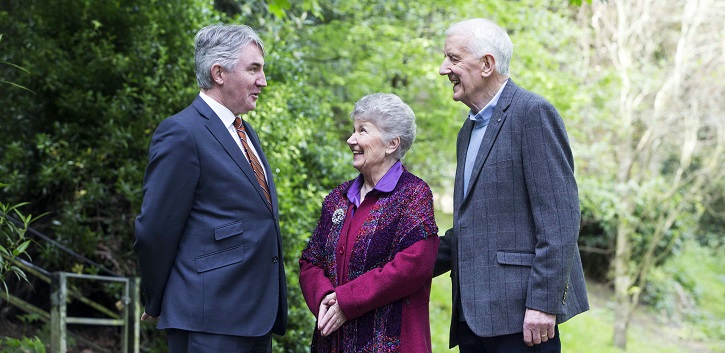Single injection ‘could repair damaged hearts’ after world-first trial

A UCC professor has shown in a trial, the first of its kind in the world, that low dose insulin-like growth factor, injected into the heart to repair damage to the muscle, improves remodelling for heart attack patients.
Professor Noel Caplice, Chair of Cardiovascular Sciences at UCC, and his cardiologist colleagues at Cork University Hospital successfully tested the growth factor in the clinical trial (RESUS-AMI), funded by a €1 million grant under the joint HRB-SFI Translational Research Award programme, of 47 patients who had experienced large attacks.
Around 20% of people who suffer heart attacks have severe ongoing difficulties because of lasting damage to heart muscle even after the best current therapies, often resulting in patients developing long-term heart failure, associated with increased morbidity and mortality.
Patients received two different low dose preparations of insulin-like growth factor or placebo in a randomised double blinded clinical trial, with results showing those who received the higher dose had improved remodelling of their heart muscle in the two-month follow-up after their heart attack, which correlated with other measures of improved heart performance.
“We are delighted that an important human study like this could be funded in Ireland and performed in Cork. This pilot trial is the first of its kind worldwide showing that single injection of low dose IGF1 is safe and can improve cardiac repair after a large heart attack,” said Professor Noel Caplice, Chair of Cardiovascular Sciences, UCC.
“We hope that these findings can be replicated in potentially larger trials of many hundred subjects in the future. A significant minority of our patients currently remain unwell after a large heart attack despite best clinical practice and we are excited by the possibility that cardiac repair therapy may help these patients,” he added.
If future bigger trials are successful, the growth factor could be applied more widely to improve the quality of life and life expectancy of any patient who has suffered a large heart attack, and be financially beneficial to the health service by reducing ongoing care costs.
John Nolan from New Ross, Wexford, became one of the patients in the trial, after suffering a heart attack in December 2014. “I feel I was blessed to be asked to be involved; I had confidence that good would come from it, in terms of how they explained it to me. Looking back on it now, I feel it was the right choice.”
John’s wife, Margaret, added: “Even as a nurse, I felt very vulnerable at the thought that my husband could’ve died. I speak on behalf of myself and my children, I’m really grateful for the aftercare and attention John received as a result of being on his trial. They updated us after every procedure as to how he was doing.”

According to Dr Mairéad O'Driscoll, Interim Chief Executive at the HRB: “Results like these are a perfect illustration of why the HRB has invested so much in building Ireland’s capacity to conduct clinical trials; so that our brilliant researchers, like Professor Caplice, can conduct research that will improve the outcomes for patients. I’d like to congratulate everyone involved in this ground-breaking project, which could have a profound global impact.”
Professor Mark Ferguson, Director General of Science Foundation Ireland and Chief Scientific Adviser to the Government, added: “I am delighted to learn about these exciting results emerging from the Translational Research Award Programme, and congratulate Professor Caplice and his colleagues on this important finding. Science Foundation Ireland is proud to invest in exceptional, collaborative research groups that can produce life-changing advances in health research, with the potential to positively impact on patient well-being globally.”
The research has been recognised and peer-reviewed by the European Society of Cardiology and the trial was presented for the first time at its Heart Failure 2017 conference in Paris this morning (April 29).
For more on this story contact:
Lynne Nolan, Media & PR Officer, UCC: 087 210 1119 or lynne.nolan@ucc.ie.
